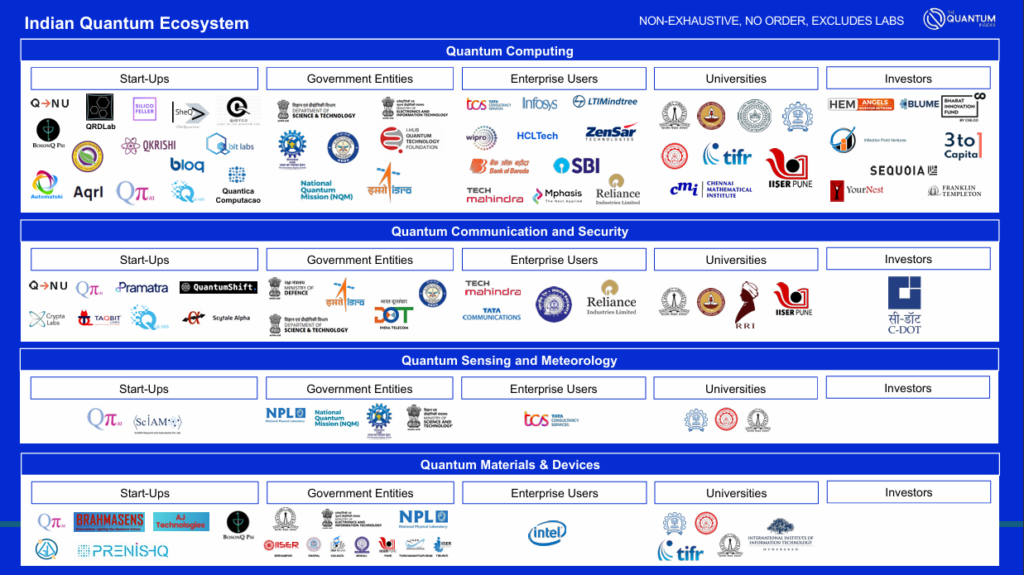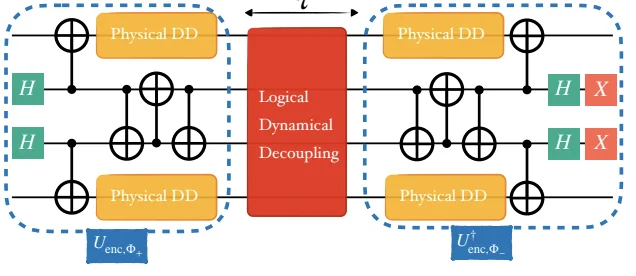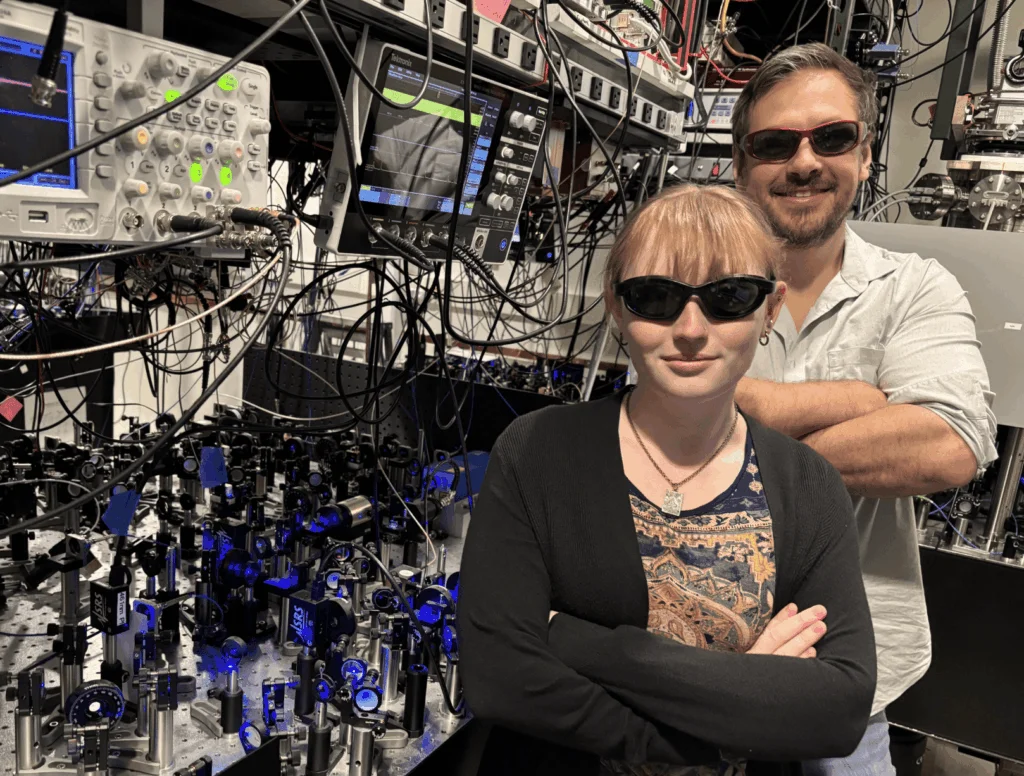India is actively building a quantum ecosystem powered by government support, academic research, and private-sector collaboration. This ecosystem encourages strategic alliances between government, industry, and academia, supporting advancements in fields ranging from quantum communication and cryptography to sensing and materials science.
India’s progress in quantum computing is also amplified by over 100 quantum research universities, numerous corporate initiatives, and specialized T-Hubs that drive innovation in specific areas of quantum technology.

India’s proactive investments are designed not only to secure a leadership position in the field of quantum computing but also to create a quantum-ready workforce and mitigate the talent drain that has impacted other emerging technologies. By focusing on foundational infrastructure, India’s quantum sector is strategically designed to support long-term growth, encourage indigenous innovation, and engage in global partnerships that bring valuable resources to the Indian quantum ecosystem.
Quantum Computing Investments and Strategic Initiatives
India’s journey toward becoming a global leader in quantum technology is fueled by a series of strategic investments and intentional initiatives. These efforts are in place to encourage a robust quantum ecosystem by bridging the gap between research and industry, empowering developers with resources, and nurturing innovation across academia, government, and private sectors. One such initiative is the Quantum Computing Applications Lab, led by the Ministry of Electronics and Information Technology in collaboration with AWS. This program equips researchers and developers with access to quantum computing platforms and tools. By expanding accessibility, the lab supports India’s aspirations to create a thriving quantum research community and technological innovation hub.

At the heart of India’s quantum ambitions is the National Quantum Mission (NQM), approved by the Union Cabinet on April 19, 2023, with a budget allocation of approximately ₹6,000 crore for the period 2023–2031. This mission complements India’s commitment to advancing scientific and industrial research in quantum technologies, including computing, communication, and cryptography.
Leaders such as Ajai Chowdhry, Chairperson of the Mission Governing Board, and Ajay Kumar Sood, Principal Scientific Adviser to the Government of India, have highlighted the mission’s significance in securing India’s strategic interests and aligning its trajectory with global quantum advancements.
A central goal within the NQM is the establishment of four Thematic Hubs (T-Hubs) across top academic and national R&D centers. Each hub focuses on a critical area of quantum technology: quantum computing, quantum communication, quantum sensing and metrology, and quantum materials and devices. These hubs are designed to encourage collaboration between academia and industry, with the hope of inspiring innovation.
Adding to these efforts is the I-Hub Quantum Technology Foundation (I-Hub QTF), hosted by IISER Pune. The foundation actively invites proposals for incubation, offering programs such as PRAYAS, which supports proof-of-concept development, and seed funding for early-stage quantum ventures. These initiatives not only promote innovation but also cultivate local entrepreneurship.
Quantum Academic Research and Innovation Hubs
India’s academic institutions are essential to their quantum research ecosystem, supporting developments that bridge fundamental science and practical applications. Guided by the government’s “Jai Anushandhan” vision, these institutions work closely with the Department of Telecommunications and the Department of Science and Technology to advance quantum technology for both society and the economy.
The Indian Institute of Science (IISc) in Bangalore is one hub for quantum research, hosting a dedicated center focused on quantum algorithms, information theory, and error correction. Similarly, IISER Pune’s I-Hub Quantum Technology Foundation (I-Hub QTF) is nurturing highly skilled talent and transforming research into socio-economically valuable products and services. Funded under the National Mission for Interdisciplinary Cyber-Physical Systems (NM-ICPS), the I-Hub QTF supports India’s goal of creating a quantum-ready workforce.
In addition to these efforts, India is focusing on building a quantum-skilled workforce through the National Mission for Quantum Frontier, which trains students and researchers with skills essential for the quantum technology field. Universities such as IISc, IIST, DIAT, and IISER Pune now offer advanced degree programs in quantum technology, further strengthening the talent pipeline for this sector.
Other leading institutions, such as the Raman Research Institute (RRI), Tata Institute of Fundamental Research (TIFR), IIT Madras, and Harish-Chandra Research Institute (HRI), contribute significantly to the country’s quantum advancements. The Quantum Information and Computing (QuIC) lab at RRI is actively pursuing quantum technologies, recently establishing secure communication channels using quantum key distribution between fixed and moving platforms.
The Tata Institute of Fundamental Research (TIFR) is testing a 6-qubit quantum processor in collaboration with the Defence Research and Development Organisation (DRDO) and Tata Consultancy Services. Under the National Quantum Mission (NQM), India plans to achieve a
By leveraging its extensive network of academic and research institutions, along with targeted workforce development programs, India is building a quantum ecosystem that integrates scientific innovation with practical applications.
Private Sector and Startup Contributions to Quantum Computing
India’s private sector complements government and academic efforts to advance quantum computing. With strategic collaborations, significant funding, and initiatives aimed at supporting innovation, private enterprises are contributing to the country’s progress in quantum technologies across various sectors.
Tata Consultancy Services (TCS) provides a quantum computing internship program in partnership with IIT Tirupati, which equips students with hands-on experience in quantum technologies. Similarly, Infosys Quantum Living Labs provides clients the opportunity to explore and implement quantum computing use cases, fostering industrial applications of quantum advancements.
Strategic collaborations have also fueled quantum innovation. For instance, Wipro’s 2021 partnership with Tel Aviv University has strengthened Indo-Israeli ties in quantum science and technology, while Mphasis’ funding of quantum startups at IIT Madras has bolstered entrepreneurship in this field. In March 2024, LTIMindtree entered into a collaboration with IBM, aligning with the National Quantum Mission to expand quantum computing capabilities across industries such as finance, healthcare, and logistics.
The startup ecosystem in India has also gained momentum. Companies like BosonQ Psi are developing software for aerospace and automotive quantum applications, while QNu Labs focuses on quantum cybersecurity with quantum key distribution systems based on the Differential Phase Shift Protocol. Notably, QNu Labs has secured $11.9 million USD to further its mission of developing secure communication solutions.
Newer startups are also gaining traction with significant funding and technological breakthroughs. QpiAI recently raised $6.5 million in pre-series A funding, led by Yournest and SIDBI Venture Capital Limited (SVCL), to develop scalable quantum computing systems, including a full-stack 25-qubit quantum computer scalable to 1,000 superconducting qubits. Bloq Quantum, a Kerala-based software startup founded in 2024, raised $155,000 USD in a pre-seed funding round led by Inflection Point Ventures (IPV). The company focuses on simplifying enterprise quantum adoption with a user-friendly low-code interface, potentially increasing quantum algorithm development speed tenfold.
Through strategic collaborations and funding entrepreneurial ventures, India’s private sector and startups are important pieces in the overall robust quantum ecosystem.
Key Figures in India’s Quantum Ecosystem
India’s quantum computing advancements are guided by leaders whose expertise and dedication are living out the country’s quantum vision. These individuals play critical roles in driving research, inspiring innovation, and strategically advancing the nation’s quantum ecosystem.
Ashutosh Sharma, former Secretary of the Department of Science and Technology, has been a passionate advocate for quantum research, recognizing its role in creating India’s global competitiveness. His efforts have laid the groundwork for several initiatives in the field.
Ujjwal Sen, a distinguished researcher at the Harish-Chandra Research Institute (HRI), has made notable contributions to quantum information theory and cryptography. Notably, his co-authored paper, “Masking Quantum Information is Impossible,” reveals the inherent limitations in concealing quantum information, impacting security frameworks in quantum communication protocols and influencing the global research community.
Other key contributors include Ajai Chowdhry, who provides strategic oversight to the National Quantum Mission as Chairperson of its Governing Board. Esteemed quantum researchers such as Urbasi Sinha, known for her experimental work in quantum optics, and Arun K. Pati, renowned for his theoretical contributions to quantum mechanics, are also active in shaping India’s efforts in quantum technology.
These leaders exemplify the collaborative spirit driving India’s quantum ecosystem, combining technical expertise with strategic vision.
India’s Quantum Ecosystem Takes Shape
India’s advancements in quantum computing represent a coordinated effort between government initiatives, academic research, private sector contributions, and an evolving startup ecosystem. Programs such as the National Quantum Mission (NQM) and Quantum Computing Applications Lab exemplify the government’s commitment to innovation, building foundational infrastructure, and supporting scientific and industrial R&D. Academic institutions like IISc, IISER Pune, and RRI play a necessary role in bridging theoretical research with practical applications, while workforce development initiatives are creating a quantum-skilled talent pool to meet future demands.
The private sector and startups are equally vital to India’s quantum ecosystem. Companies like TCS, Infosys, and emerging ventures such as QNu Labs and Bloq Quantum are supporting industrial adoption and entrepreneurial innovation through collaborations and funding. Under the leadership of key figures like Ajai Chowdhry and Ujjwal Sen, India is building a quantum ecosystem designed to innovate in quantum technologies ranging from communication and cryptography to sensing and materials science.













